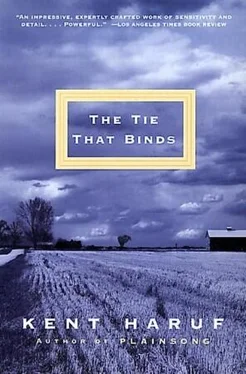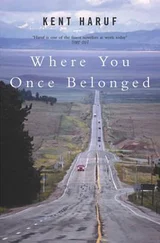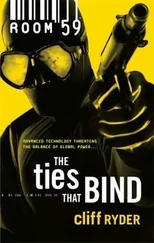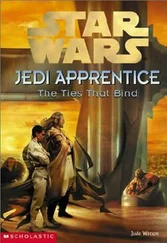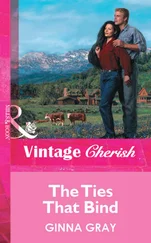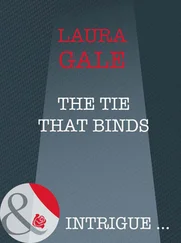Kent Haruf
The Tie That Binds
Acclaim for KENT HARUF’ s THE TIE THAT BINDS
“This is strong stuff, and marvelous writing.”
— John Irving
“Haruf’s voice. . resonates across the plains.”
— Los Angeles Herald-Examiner
“There are people in this novel — individuals so deftly sketched that the reader knows how they look, sound and think.”
— The Oregonian
“Haruf writes in the tradition of Hamlin Garland and Willa Cather about the constricted lives and obscure destinies of small farmers on the Great Plains. . He knows his people and knows the quality of their lives; and with a simple, engaging style he makes the reader care about them.”
— Library Journal
“A powerfully eloquent tribute to the essential dignity and tenacity of the human spirit.”
— Booklist

KENT HARUF
THE TIE THAT BINDS
Kent Haruf’s The Tie That Binds received a Whiting Foundation Award and a special citation from the PEN/Hemingway Foundation. He is also the author of Where You Once Belonged, Plainsong , a finalist for the National Book Award, and Eventide . He lives with his wife, Cathy, in Colorado.
EDITH GOODNOUGH isn’t in the country anymore. She’s in town now, in the hospital, lying there in that white bed with a needle stuck in the back of one hand and a man standing guard in the hallway outside her room. She will be eighty years old this week: a clean beautiful white-haired woman who never in her life weighed as much as 115 pounds, and she has weighed a lot less than that since New Year’s Eve. Still, the sheriff and the lawyers expect her to get well enough for them to sit her up in a wheelchair and then drive her across town to the courthouse to begin the trial. When that happens, if that happens, I don’t know that they will go so far as to put handcuffs on her. Bud Sealy, the sheriff, has turned out to be a son of a bitch, all right, but I still can’t see him putting handcuffs on a woman like Edith Goodnough.
On the other hand, I don’t suppose Bud Sealy ever intended to become a son of a bitch at all. As late as nine days ago he was sitting on a barstool at the lunch counter in the Holt Café. It was Friday afternoon; it was about two-thirty, that slack time that comes every day for him when he’s got all his paper work filled out, when there isn’t a thing more for him to do except wait for the high school kids to get out of school so they can begin to race up and down Main Street or drive out onto U.S. 34 and cut cookies on the blacktop. So Bud had time. He was relaxing. Already he had eaten his butterscotch pie and Betty had cleared his plate. Now, while he waited for his second cup of black coffee to cool, he was turned around on the barstool so as to front the men who sat opposite him in the booths. The men had come in earlier in their town pants and adjustable caps. Two or three of them had slapped him on the back like they do, and they had all taken their places on the other stools or in the nearby booths so they could hear the talk and keep current.
Most of the talk that afternoon was Bud’s. He was telling them a story. I believe most of the men had heard this particular story at least twice before, though I doubt that any one of them would have thought to stop him from telling it again, since the one thing they all had too much of was just that — time. I mean two or three had already retired from the work they had never gotten around to beginning.
At any rate, the story Bud was telling that afternoon had to do with how there was this guy at the National Western Stock Show who was walking around in public with a piece of pink thread tied to himself, like what it was tied to was one of the agricultural exhibits in the pavilion hallways. He was sort of displaying himself to folks. That is, until the police collared him and took him to jail for indecent exposure and creating a nuisance. They booked him. A few weeks later when they stood him up in front of a judge — an old man with wire glasses and no hair to speak of — the judge says to him: “Son, I’m going to ask you just one question and I want an answer. Son, are you crazy?” And the guy with the pink thread says, “No sir, I don’t believe so.” And the judge says: “Well then, are you just half crazy?” And the guy says. .
But Bud never got to say this time what the guy says, because just then someone walked into the Holt Cafe that neither Bud nor any of the other men knew. He asked which one of them was the sheriff. One of the boys pointed to Bud.
It turned out this new man was a newspaper reporter from Denver. He had just driven into town. At the police station they had told him that he might discover the sheriff at the Holt Café, and he did. So I date it about then, a little after two-thirty on a Friday afternoon in April, that Bud Sealy started seriously to become a son of a bitch. Because in a few minutes Bud and this Denver man went out to the town’s cop car; they drove off up Main Street, and I don’t guess they had driven long or far before Bud gave him the fifty-pound bag of chicken feed that had been knifed open and laid in easy access for the six or seven chickens, laid just inside the chicken coop where it wouldn’t get wet or snowed on.
That was not enough, however. That did not satisfy him. The man from Denver wanted more than just chicken feed. So Bud turned off onto one of the residential streets and drove a block or two under the budding elm trees risen along the curb, and then on Birch Street or Cedar he gave him the dog too, told him how the old milky-eyed dog, which had never been tied up before, had nevertheless been tied up that particular December afternoon three and a half months ago and again within easy reach of several days’ food and water.
But that still was not enough. Chicken feed and an old dog must have only whet the Denver man’s appetite. Besides, I suppose he was beginning to crowd Bud now, shove him hard for more. Then too, maybe by this time Bud was beginning to see something in it for himself. Perhaps Bud imagined that having his name appear on the front page of a Denver newspaper would somehow insure his twenty-year-old investment at the local county polls, as if it would permanently close an insurance policy with us that would make us want to go on marking that X beside his name come the first Tuesday in November. Because with his name featured prominent in the big city papers and on the front page, no less, we’d be proud of him, take pride in one of our own’s managing such a thing, and then he wouldn’t ever have to do any more storytelling in the Holt Café in order to collect from us. All he would have to do would be to enter his name on the proper election papers at the appointed time and see to it that it was spelled right, and then — why hell — just go on paying his wife’s doctor bills and sending those tuition payments to the state university in Boulder, where it looked like his kid was never going to amount to a goddamn or even to graduate.
But I can’t say for sure that’s how Bud was thinking. What I’ve suggested is based only on what I know about him after these fifty years of seeing and talking to him about once every week. No, all I know for sure is that his cop car was out in the country a little later that same afternoon and he and the Denver man were still in it, still talking, still licking up to one another like they were a couple of dogs discussing the fresh joys of a bitch in heat. Only they were not discussing copulation, nor love and the weather, nor even the price of fat hogs at the sale barn in Brush. It was more than that. I believe it was a lot more, because it was then and there, with corn stubble on one side and green wheat on the other, that Bud Sealy emptied himself. He gave him Edith Goodnough.
Читать дальше
